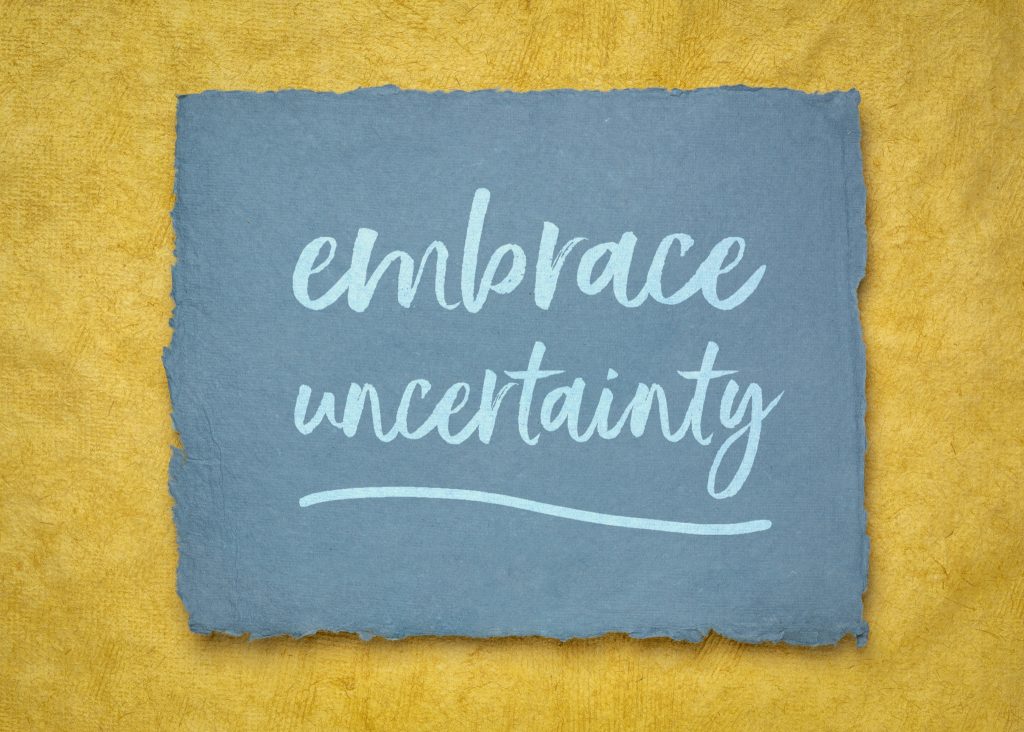As the ancient Greek and Roman Stoics understood, much of human suffering arises from our attempts to control that which is not under our control. The main thing we try but fail to control is, of course, the future (the professional worriers amongst us, anyway). We want to know, from our vantage point in the present, that things will be okay later on. It’s inaccurate to say we live in especially uncertain times, as the future is always uncertain, it’s just that the pandemic has made us very aware of it. Uncertainty, like gravity, has been a constant feature of our world, as Oscar Wilde’s character Algernon stated in his play, ‘The Importance of Being Earnest’, “the very essence of romance is uncertainty”, a fact that he planned to conveniently forget should he marry!
The best clinical definition of worry to date states “A tendency to be bothered or upset by the unknown elements of a situation, whether the possible outcome is negative or not”. Many worriers find the threat of uncertainty intolerable and their instinct is to avoid it if possible. If not possible, then they are likely to deploy worry, a ‘one-size-fits-all’ approach, even when it is not a suitable solution. As author Eckart Tolle commented, “If uncertainty is unacceptable to you, it turns into fear”. Worriers need only a tiny amount of uncertainty to trigger excessive worry and anxiety, often referred to as a “splinter of doubt” by leading CBT academics. Those prone to worry have a heightened reactivity to the threat of uncertainty, and hate not knowing, so worry becomes a way of trying to wrestle certainty from the jaws of uncertainty, but this frenetic mental activity tends to reveal new problems, which in turn generate more worry.
Worry is often experienced as a chain of negative thoughts, images and doubts about things that might happen in the future, perhaps summed up as “every silver lining has a cloud”. Worriers tend to be concerned by what’s around the corner, rather than what’s here right now. For the most part, worry is not about things where the outcome is certain, it’s about things where the outcome is uncertain. As a result, worriers tend to get caught up in the whirlwind of thoughts about bad things that might happen, feeling as if they can’t stop the worry loop. Attempts to push these thoughts away may work for a moment, only for them to pop back up again, and bring their friends! I often describe this to clients as similar to the fairground game of ‘whack-a-mole’. Published research suggests two components are key: 1. the desire for predictability and 2. behavioural paralysis. People often feel overwhelmed, helpless or incapacitated in the face of uncertainty, whilst excessive worry can lead to physical tension, sleep disturbance, irritability, stomach knots and headaches.
Living this way has a profound effect on the ability to live life in the moment. Worry transports us away from the here and now to a tense and anxiety-provoking future.
Some of the behaviours that people cling on to when they are intolerant of uncertainty include:
- Seeking reassurance from others. This might be asking friends or family for their opinion on a decision that you have to make, sometimes repetitively, just to make sure they’ve understood the situation.
- List-making/becoming preoccupied with detail/extensive planning.
- Double checking. This might be calling loved ones repeatedly to make sure that they are okay, or re-reading emails several times to check that they are perfect and that there are no spelling mistakes.
- Refusing to delegate tasks to others. Many people who are intolerant of uncertainty will not allow anyone either at work or at home to do certain tasks, as they cannot be sure that it will be done correctly unless they do it.
- Procrastination/avoidance: If you do not do something, then you don’t have to feel uncertain about it! Or perhaps you’re a ditherer, flip-flopping between engagement and avoidance?
- Partial engagement, “hedge your bets”.
- Become rigid and inflexible.
- ‘Negative urgency’. An academic term for acting impulsively and making knee-jerk decisions in order to minimise losses. Of course, these choices may not prove to be the most advantageous in the longer-term when more information comes to hand.

To overcome chronic worry, my central message is that we must attend to the flow and the factors that influence this, rather than focusing on each individual worry.
In my opinion, excessive worry should not be accepted as a normal response to all life events, nor should it be accepted as part of someone’s personality. We aren’t born avoidant of uncertainty, we are born engaged and curious.
Clinical research suggests that we all sit somewhere on the intolerance continuum, but also that we can change this position. It’s understandable to want to feel ‘safe’, so therapy requires us to be courageous and be willing to try out new things, including being open to letting go of this habitual response. It’s still useful to make plans. But do that with the awareness that a plan is only ever a present moment statement of intent. This doesn’t mean not trying to make life better, it just means not living each day anxiously braced to see if things work out as you hoped.


